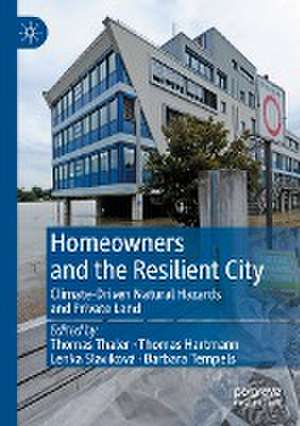Homeowners and the Resilient City: Climate-Driven Natural Hazards and Private Land
Editat de Thomas Thaler, Thomas Hartmann, Lenka Slavíková, Barbara Tempelsen Limba Engleză Paperback – 3 ian 2024
This book provides an important overview of how climate-driven natural hazards like river or pluvial floods, droughts, heat waves or forest fires, continue to play a central role across the globe in the 21st century. Urban resilience has become an important term in response to climate change. Resilience describes the ability of a system to absorb shocks and depends on the vulnerability and recovery time of a system. A shock affects a system to the extent that it becomes vulnerable to the event. This book focus examines how private property-owners might implement such measures or improve their individual coping and adaptive capacity to respond to future events. The book looks at the existence of various planning, legal, financial incentives and psychological factors designed to encourage individuals to take an active role in natural hazard risk management and through the presentation of theoretical discussions and empirical cases shows how urban resilience can be achieved. Inaddition, the book guides the reader through different conceptual frameworks by showing how urban regions are trying to reach urban resilience on privately-owned land. Each chapter focuses on different cultural, socio-economic and political backgrounds to demonstrate how different institutional frameworks have an impact.
| Toate formatele și edițiile | Preț | Express |
|---|---|---|
| Paperback (1) | 888.97 lei 6-8 săpt. | |
| Springer International Publishing – 3 ian 2024 | 888.97 lei 6-8 săpt. | |
| Hardback (1) | 894.16 lei 6-8 săpt. | |
| Springer International Publishing – 2 ian 2023 | 894.16 lei 6-8 săpt. |
Preț: 888.97 lei
Preț vechi: 1084.11 lei
-18% Nou
Puncte Express: 1333
Preț estimativ în valută:
170.16€ • 184.89$ • 143.03£
170.16€ • 184.89$ • 143.03£
Carte tipărită la comandă
Livrare economică 21 aprilie-05 mai
Preluare comenzi: 021 569.72.76
Specificații
ISBN-13: 9783031177651
ISBN-10: 3031177657
Ilustrații: XXII, 301 p. 13 illus., 10 illus. in color.
Dimensiuni: 148 x 210 mm
Greutate: 0.39 kg
Ediția:1st ed. 2022
Editura: Springer International Publishing
Colecția Palgrave Macmillan
Locul publicării:Cham, Switzerland
ISBN-10: 3031177657
Ilustrații: XXII, 301 p. 13 illus., 10 illus. in color.
Dimensiuni: 148 x 210 mm
Greutate: 0.39 kg
Ediția:1st ed. 2022
Editura: Springer International Publishing
Colecția Palgrave Macmillan
Locul publicării:Cham, Switzerland
Cuprins
Introduction.- Resilient cities and homeowners action: governing for flood resilience through homeowner contributions.- Propety, property rights and natural hazards and beyond.- Individual behaviour in disaster risk reduction.- Resilient flood recovery – financial schemes for the recovery-mitigation nexus.- Resident’s role in Sponge City construction and urban flood disaster relief of China.- Factors influencing flood related coping appraisal among homeowners and residents in Kampala, Uganda.- Addressing the homeowners’ barriers to Property-Level Flood Risk Adaption: A case study of tailored expert advice in Belgium.- Strategic risk communication to increase the climate resilience of households – Conceptual insights and a strategy example from Germany.- Government, homeowners, and wildfire: what can we learn from California’s resilience planning experience?.- Supporting stakeholder-based adaptation to climate change: experiences in theCity of Melbourne.- Conclusion.
Notă biografică
Thomas Thaler is a Research Fellow at the Institute of Mountain Risk Engineering, University of Natural Resources and Life Sciences, Vienna, Austria.
Thomas Hartmann is the chair of land policy and land management at the School of Spatial Planning, TU Dortmund University, Dortmund, Germany.
Lenka Slavíková is Associate Professor in public economics at J.E.P.University in Ústí nad Labem, Czech Republic.
Barbara Tempels is Assistant Professor at the Department of Environmental Sciences at Wageningen University, Wageningen, the Netherlands.
Thomas Hartmann is the chair of land policy and land management at the School of Spatial Planning, TU Dortmund University, Dortmund, Germany.
Lenka Slavíková is Associate Professor in public economics at J.E.P.University in Ústí nad Labem, Czech Republic.
Barbara Tempels is Assistant Professor at the Department of Environmental Sciences at Wageningen University, Wageningen, the Netherlands.
Textul de pe ultima copertă
This book provides an important overview of how climate-driven natural hazards like river or pluvial floods, droughts, heat waves or forest fires, continue to play a central role across the globe in the 21st century. Urban resilience has become an important term in response to climate change. Resilience describes the ability of a system to absorb shocks and depends on the vulnerability and recovery time of a system. A shock affects a system to the extent that it becomes vulnerable to the event. This book focus examines how private property-owners might implement such measures or improve their individual coping and adaptive capacity to respond to future events. The book looks at the existence of various planning, legal, financial incentives and psychological factors designed to encourage individuals to take an active role in natural hazard risk management and through the presentation of theoretical discussions and empirical cases shows how urban resilience can be achieved. In addition, the book guides the reader through different conceptual frameworks by showing how urban regions are trying to reach urban resilience on privately-owned land. Each chapter focuses on different cultural, socio-economic and political backgrounds to demonstrate how different institutional frameworks have an impact.
Caracteristici
Discusses the implementation of risk reduction measures for individual homeowners and residents Highlights several international cities as case studies for disaster risk reduction initiatives Provides practical, sustainable solutions to a variety of natural hazard events
